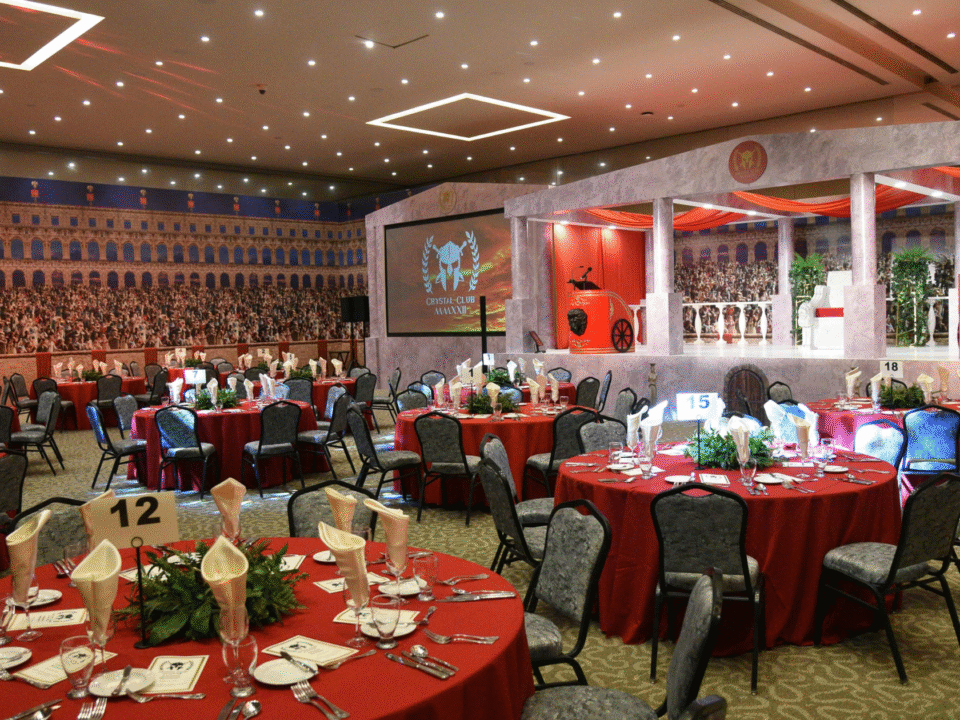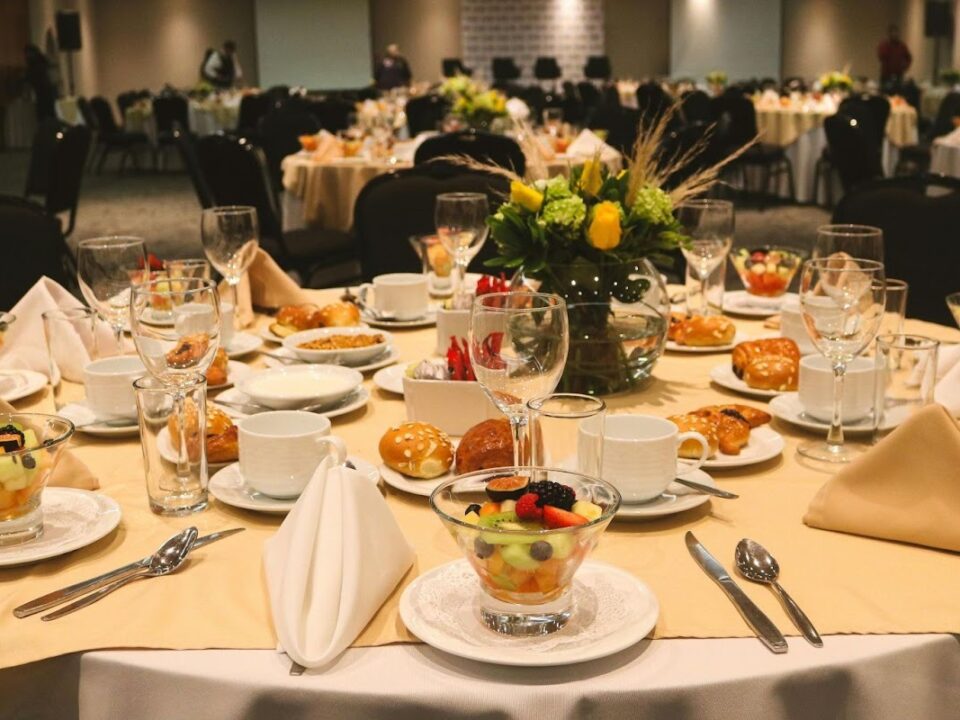Conference Space NYC: A Guide To The City’s Best Business Venues

Cozy And Romantic: Discovering Small Intimate Wedding Venues
December 15, 2023
Destination Wedding Space NYC: A Love Affair With The City
December 17, 2023In the bustling metropolis of New York City, where business thrives, ideas evolve, and innovation takes center stage, selecting the right conference space NYC offers more than just a logistical solution; it becomes a strategic decision that can influence the success and impact of an entire event. Whether you’re hosting a high-stakes board meeting, a corporate training seminar, a product launch, or a networking reception, the venue serves as more than a backdrop; it becomes a reflection of your brand, professionalism, and attention to detail. In such a competitive and fast-paced environment, the location, ambiance, and functionality of the conference space play a critical role in shaping attendees’ first impressions and setting the tone for productive and meaningful engagement.
Amidst the towering skyscrapers, iconic landmarks, and relentless energy that define Manhattan, 3 West Club emerges as a premier destination for corporate gatherings. As a distinguished large conference space NYC professionals trust, this venue offers a rare combination of historic character and modern amenities. Strategically located in Midtown, just steps from Rockefeller Center and major transit hubs, it provides unmatched accessibility for both local attendees and out-of-town guests. With its grand ballrooms, private meeting rooms, and classic architectural details, the 3 West Club embodies the legacy of New York while embracing the needs of today’s business leaders.
From advanced audiovisual capabilities and customizable seating layouts to professional event support and in-house catering, every element is designed to facilitate seamless and successful meetings. The club’s refined yet welcoming atmosphere promotes focus, collaboration, and productivity, allowing your message to take center stage. Whether you’re organizing an executive retreat or a full-scale conference, 3 West Club offers the kind of environment that elevates your event from ordinary to exceptional, ensuring that your guests leave not only impressed but inspired.
The Essence of Ideal Business Venues
In the dynamic landscape of business, where first impressions can significantly impact partnerships and collaborations, selecting the right conference space NYC is akin to setting the stage for success. The essence of an ideal business venue transcends the physical space; it encompasses a blend of characteristics that contribute to the overall success and atmosphere of professional gatherings.
-
Technological Sophistication:
In an era where digital tools drive communication, collaboration, and decision-making, the best business venues prioritize seamless integration of technology at every level. A technologically advanced conference space should be equipped with state-of-the-art audio-visual systems, including high-definition projectors, wireless microphones, digital screens, and video conferencing capabilities to support hybrid or remote participation. In addition to robust hardware, these venues must offer reliable, high-speed internet connectivity capable of handling large data transfers and multiple devices simultaneously. Touchless presentation systems, secure charging stations, and integrated control panels further streamline the meeting experience. This level of sophistication ensures that presentations run smoothly, virtual attendees stay engaged, and every participant can interact effectively in a digital-first environment. -
Adaptability:
No two business events are the same, and a truly exceptional venue understands the importance of flexibility. Whether it’s a multi-day corporate summit, a product launch, a brainstorming session, or a high-level board meeting, the ability to customize the layout and scale of the space is key. Adaptable venues provide modular rooms, movable partitions, and varied seating configurations—from theater and classroom styles to U-shaped or banquet layouts. This ensures that the physical space aligns with the event’s objectives, enhancing both comfort and communication. Additionally, on-site support teams should be available to reconfigure rooms quickly and efficiently, allowing seamless transitions between breakout sessions, panel discussions, and networking functions. -
Professional Ambiance:
The atmosphere of a business venue has a direct impact on attendees’ perception and productivity. A professional ambiance is more than just clean lines and modern decor—it’s about creating a space that inspires confidence, focus, and high performance. Ideal venues balance sophistication with functionality, using natural light, acoustically treated rooms, ergonomic furnishings, and tasteful design to foster a sense of purpose and calm. The setting should feel polished yet welcoming, helping guests feel comfortable while maintaining a standard of excellence. From the moment attendees walk through the door, the ambiance should reinforce the tone of the event—whether it’s formal, collaborative, innovative, or celebratory. -
Strategic Location:
Convenience is a cornerstone of any successful business event. A venue’s location can significantly affect turnout, punctuality, and the overall attendee experience. The ideal venue is situated in a strategic part of the city—preferably close to major transportation hubs like airports, train stations, and subway lines—so attendees can arrive without stress. Nearby accommodations, restaurants, and retail options further enhance accessibility and offer guests additional convenience before and after the event. In a city like New York, where time is a premium and traffic is constant, being centrally located not only saves time but elevates the overall appeal and prestige of the gathering. For corporate clients, choosing a venue in a respected neighborhood adds credibility and reinforces the event’s importance.
Event Spaces’ Historic and Sophisticated Features that Make It Stand Out
-
Historic Charm:
There’s something inherently powerful about holding a business event in a space that carries the weight and elegance of history. Historic venues bring more than just aesthetic appeal—they offer character, gravitas, and a sense of continuity that newer spaces often lack. The intricate moldings, grand staircases, vintage chandeliers, and stately ballrooms found in these buildings evoke a timeless narrative, adding an air of distinction and significance to any event. For corporate gatherings, this historical depth can foster a deeper sense of purpose and tradition, encouraging thoughtful discussion and reflection. A venue like 3 West Club, steeped in history, creates a memorable atmosphere where tradition and progress meet, making it an ideal setting for executive meetings, galas, and milestone events. -
Timeless Sophistication:
Trends in event spaces come and go, but sophistication rooted in classic design endures. The best business venues don’t rely on flashy gimmicks or overly modern design; instead, they offer spaces that feel effortlessly refined. Think marble floors, high ceilings, rich wood paneling, and tailored decor that maintains a sense of prestige without overwhelming the senses. Timeless sophistication enhances the professionalism of any corporate event, providing a neutral yet elevated canvas that allows the content and goals of the meeting to shine. At 3 West Club, the interiors evoke a sense of lasting elegance, creating a stage where both tradition and innovation are honored in equal measure. -
Attention to Detail:
In the world of professional events, success often hinges on the smallest of details. From the crisp linens and polished glassware to the lighting temperature and acoustics, every element contributes to the overall experience. A truly exceptional business venue pays close attention to these aspects, ensuring that nothing is overlooked. At 3 West Club, this philosophy is evident in the precision of room arrangements, the responsiveness of the event staff, and the seamless coordination of logistics. Whether it’s ensuring the technology is tested in advance or that water glasses are replenished discreetly, these thoughtful touches not only impress guests but allow hosts to focus on the event itself with confidence and ease. -
Distinctive Features:
In a city as vibrant and competitive as New York, standing out takes more than just functionality—it requires personality. Distinctive features are what set a great venue apart from a good one. This might include a rooftop terrace with skyline views, a historic ballroom with original architectural elements, or private rooms that offer intimacy within a grand setting. These elements give a venue its identity and leave a lasting impression on guests. At 3 West Club, the blend of old-world charm and modern comfort is complemented by unique spaces like the Solarium or the Grand Ballroom, which offer one-of-a-kind settings for impactful gatherings. These memorable features contribute to the essence of the venue and create a lasting association between the space and the success of your event.
A Guide to Selecting Business Venues
Business events, ranging from conferences to corporate meetings, demand careful consideration when selecting the venue. The right venue can significantly impact the success of an event, making the process of choosing one a critical aspect of event planning. Here is a comprehensive guide to help businesses navigate the selection of an ideal venue for their professional gatherings.
Experience Elegance in Midtown
Host your next holiday dinner or private event at 3 West Club. Discover refined dining and historic charm in the heart of Manhattan.
1. Defining the Purpose and Objectives:
Identify Event Goals: Begin by clearly defining the purpose of the event. Whether it’s a product launch, a conference, or a team-building retreat, understanding the goals will guide the selection process.
Consider Attendee Experience: Envision the type of experience you want attendees to have. This includes the atmosphere, level of formality, and the overall impression you want the event to leave.
2. Estimating Attendee Count and Space Requirements:
- Accurate Attendance Forecast: Have a realistic estimate of the number of attendees. This is crucial for selecting a venue that can comfortably accommodate everyone.
- Space Configurations: Consider the various spaces within a venue and how they can be configured to meet different needs. A versatile venue allows for flexibility in hosting various event formats.
3. Assessing Technological Infrastructure:
- Tech Requirements: Evaluate the technological needs of the event, including audio-visual requirements, internet connectivity, and any specific tech tools needed for presentations or interactions.
- Venue’s Tech Capabilities: Ensure that the chosen venue is equipped with the necessary technological infrastructure to support the event seamlessly.
4. Budget Considerations:
- Transparent Pricing: Seek transparency in the venue’s pricing structure. Understand what is included in the rental fee and if there are any additional costs for amenities or services.
- Negotiation Opportunities: Don’t hesitate to negotiate. Many venues are open to discussions on pricing, especially if you are booking well in advance or during non-peak times.
5. Accessibility and Location:
- Central Location: Choose a venue that is centrally located and easily accessible. Consider proximity to transportation hubs, accommodation options, and amenities.
- Parking Facilities: If attendees are driving, ensure that the venue offers convenient and secure parking facilities.
6. Venue Reputation and Reviews:
- Research and Reviews: Look for reviews and testimonials from previous clients who have hosted similar events at the venue. Online platforms and testimonials can provide valuable insights.
- Venue Reputation: Consider the overall reputation of the venue in the industry. A venue with a positive reputation is more likely to deliver a successful event.
7. On-Site Amenities and Services:
- Catering Options: Explore the venue’s catering options. Some venues offer in-house catering, while others allow external catering. Ensure that the catering aligns with the event’s theme and dietary preferences.
- Event Planning Support: Check if the venue provides event planning support. Experienced venue staff can contribute significantly to the smooth execution of the event.
8. Sustainability Practices:
- Environmental Impact: Consider the venue’s sustainability practices. Many businesses are increasingly focused on hosting events with minimal environmental impact.
- Green Certifications: Some venues may have certifications for sustainable practices. Inquire about any green certifications or initiatives they may have in place.
9. Visit the Venue:
- Site Visit: Whenever possible, schedule a site visit. This allows you to experience the space firsthand, visualize event setups, and address any concerns directly with the venue staff.
- Event Walkthrough: Walk through the event flow with the venue coordinator. Discuss logistics, potential challenges, and any specific requirements for the event.
Conclusion
In the diverse and fast-paced landscape of New York City, where the expectations of business are constantly evolving and the standards for excellence are ever-rising, selecting the right conference space is far more than a logistical necessity, it’s a strategic decision that can shape outcomes, influence perceptions, and determine the overall success of an event. A thoughtfully chosen venue doesn’t just accommodate guests; it enhances engagement, fosters collaboration, and reinforces the values and vision of the organization hosting the event. From board meetings and training seminars to product launches and executive summits, the right environment has the power to transform routine gatherings into memorable, results-driven experiences.
As this guide comes to a close, one message remains clear: the venue matters. And for businesses seeking more than just a room with chairs and Wi-Fi, 3 West Club offers something exceptional. Located in the very heart of Manhattan, where commerce, culture, and opportunity converge, the club delivers not just a place to meet, but a setting designed to impress. It’s where classic elegance meets modern functionality; where the ambiance of historic architecture is enhanced by the tools and technology today’s professionals rely on. While many hotels conference rooms in NYC offer are impersonal or overly corporate, 3 West Club brings warmth, distinction, and a tailored experience that’s hard to replicate.
That’s why we extend this invitation to elevate your next event with the 3 West Club. More than just a venue, it’s an experience, a blend of grace, history, and business acumen that speaks volumes before a single word is said. From the moment your guests arrive to the final farewell, every detail is crafted to reflect professionalism, prestige, and purpose. For businesses that want to make a powerful and lasting impression, 3 West Club stands ready to be the canvas for your next sophisticated and successful event.






